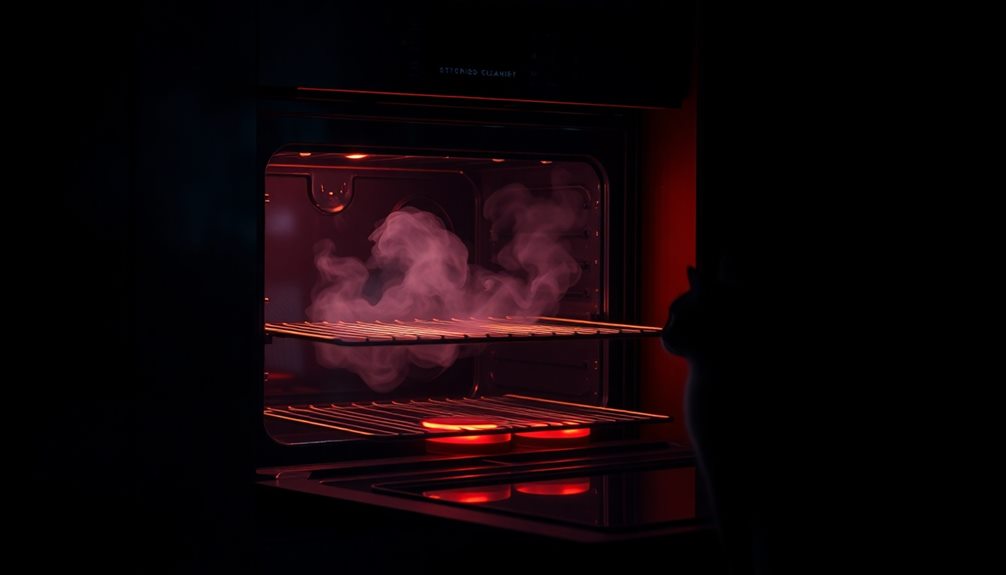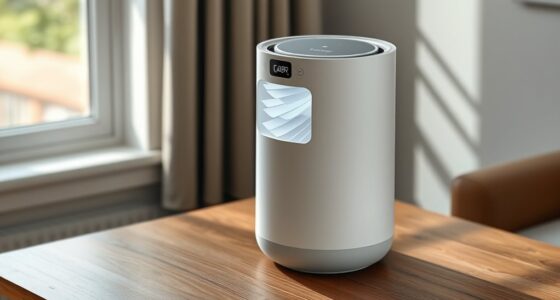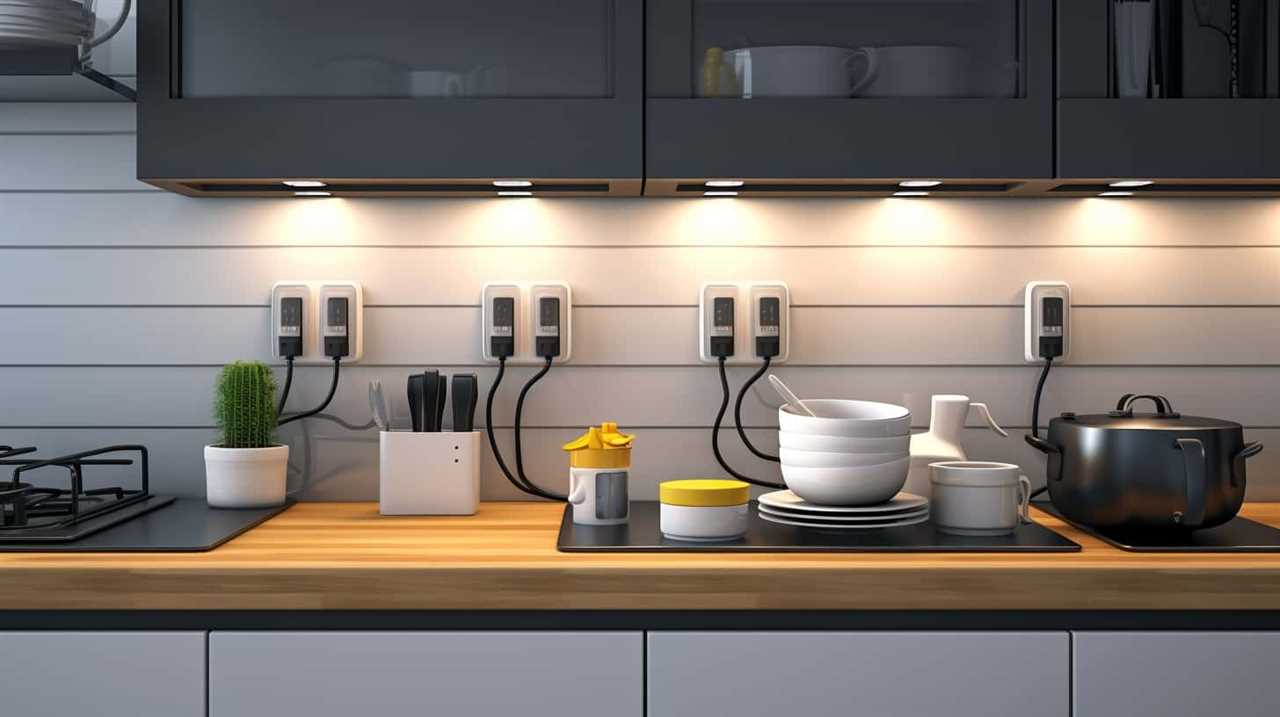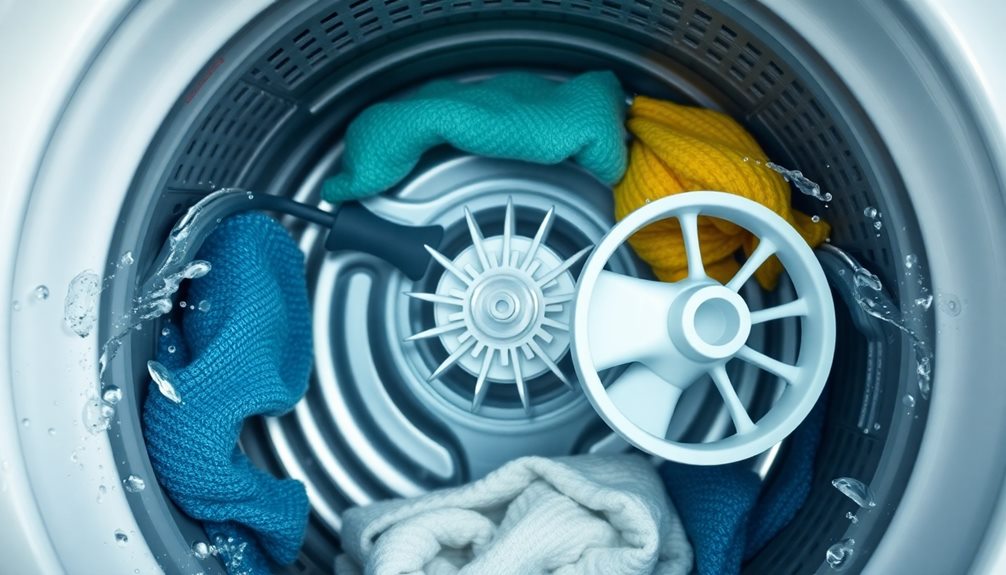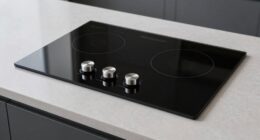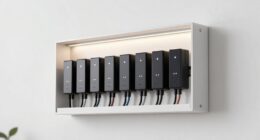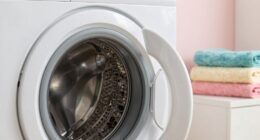Self-cleaning ovens may seem like a dream, but they hide some serious dangers you should know about. When they heat up to over 800°F, they can release toxic fumes, including carbon monoxide, which can be harmful to you and your pets. If there's inadequate ventilation, the risks increase, potentially leading to health hazards and costly repairs due to damaged internal components. Relying solely on self-cleaning can also contribute to higher energy consumption and a larger carbon footprint. You might be surprised by safer alternatives that effectively clean your oven without these hidden dangers.
Key Takeaways
- Self-cleaning ovens operate at extremely high temperatures, potentially releasing toxic fumes and carbon monoxide from burnt food, posing serious health risks.
- The intense heat can damage internal components over time, leading to costly repairs and increased risk of fire hazards.
- Inadequate ventilation during the self-cleaning process can exacerbate overheating issues and negatively affect indoor air quality.
- Pets, especially birds, are particularly vulnerable to harmful fumes released during self-cleaning cycles, making ventilation essential for their safety.
- Eco-friendly alternatives, such as baking soda and vinegar, offer safer and more environmentally friendly cleaning options without the risks associated with self-cleaning ovens.
Overview of Self-Cleaning Ovens
Self-cleaning ovens offer a convenient way to tackle stubborn food residues with minimal effort. These appliances operate at extremely high temperatures, usually between 800°F to over 1000°F, effectively burning away grime and converting it to ash. The cleaning process typically lasts several hours, during which the oven door locks automatically to guarantee safety.
While you might appreciate this feature, it's important to be aware of the potential dangers involved. Self-cleaning ovens can sometimes cause damage to internal components, leading to increased repair costs. Additionally, the intense heat can release toxic fumes, particularly from burnt food and certain coatings, like Teflon.
To minimize risks, it's significant to remove all items from the oven before starting the cleaning cycle. Proper ventilation in your kitchen is also essential during this time to reduce smoke and fume exposure.
Manufacturers recognize that while self-cleaning features appeal to many consumers, they may lead to unexpected maintenance issues down the line. Understanding these aspects can help you make informed decisions about using self-cleaning ovens and steering their convenience safely.
Health Risks and Concerns

Have you considered the health risks associated with using a self-cleaning oven? While these appliances can simplify your cleaning routine, they come with serious concerns. Self-cleaning ovens reach high temperatures, often exceeding 1000°F, which can release carbon monoxide from burnt food, especially in poorly ventilated spaces. This poses a significant poisoning risk.
The self-cleaning process can emit toxic fumes from Teflon coatings heated above 600°F, causing respiratory irritation and flu-like symptoms. Pets, particularly birds, are extremely vulnerable to these hazardous fumes and can suffer severe health issues from even mild exposure.
Here's a quick overview of the health risks:
| Health Risk | Impact on Humans | Impact on Pets |
|---|---|---|
| Carbon Monoxide | Poisoning risk | N/A |
| Toxic Fumes | Respiratory irritation | Severe health issues |
| Caustic Particles | Respiratory distress | Severe respiratory issues |
To protect yourself and your pets, guarantee proper ventilation during and after the cleaning cycle. If you have asthma or other respiratory concerns, consider leaving your home during this process to avoid harmful fume exposure.
Environmental Impact of Self-Cleaning
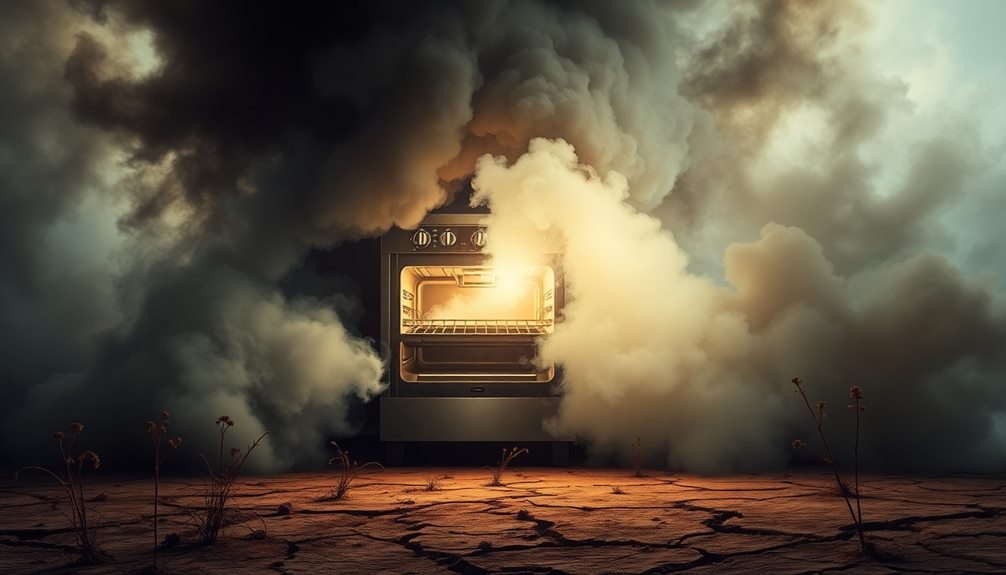
Using a self-cleaning oven not only raises health concerns but also carries considerable environmental implications. The high temperatures—over 1000°F—used during the self-cleaning cycle lead to increased energy consumption, which contributes to higher carbon footprints compared to traditional cleaning methods.
Furthermore, these cycles can release harmful emissions, adversely affecting indoor air quality and the environment.
Consider these environmental impacts:
- Increased energy consumption boosts your carbon footprint.
- Harmful emissions like carbon monoxide compromise indoor air quality.
- Premature wear and tear generates more waste from appliance replacements.
If you're looking for a more eco-friendly approach, natural cleaning alternatives, like baking soda and vinegar, can greatly minimize your environmental impact. They reduce chemical usage and promote safer indoor air quality.
Alternatives to Self-Cleaning Ovens

When it comes to keeping your oven clean, several effective alternatives can spare you from the drawbacks of self-cleaning models. One popular option is using natural cleaning methods, like a mixture of baking soda and vinegar. This method effectively removes grime without the risks of harmful fumes associated with self-cleaning ovens.
Additionally, maintaining a clean kitchen is essential for promoting healthier lifestyles, as it supports cleanliness and hygiene. If you prefer a more robust solution, commercial oven cleaning products can provide detailed cleaning results while minimizing your exposure to toxins.
Another great alternative is hiring professional cleaning services. They can guarantee an all-encompassing clean, saving you time and effort while keeping your kitchen safe.
Regular maintenance practices, such as frequent light cleaning, can also prolong your oven's life, making deep cleans less necessary.
If you're considering a new oven, investing in non-self-cleaning ovens may prove to be more cost-effective in the long run. You'll avoid potential repair costs tied to self-cleaning features while still maintaining a clean cooking environment.
Maintenance Tips for Ovens
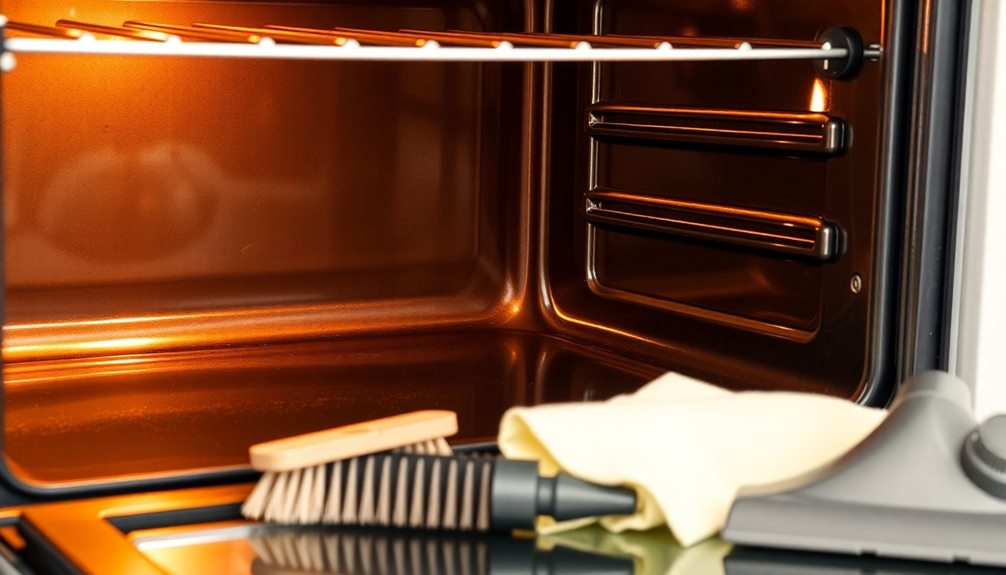
To keep your oven in top shape, regular manual cleaning is essential.
Use safe cleaning products like baking soda and vinegar to tackle grime without the risks of self-cleaning.
Don't forget to inspect door seals and heating elements often to catch any issues early and maintain efficiency.
Regular Manual Cleaning
Maintaining your oven through regular manual cleaning not only extends its lifespan but also guarantees peak cooking performance. Unlike self-cleaning ovens that can be harsh on components, manual cleaning allows you to carefully manage the upkeep of your appliance.
Here are some essential tips to keep in mind:
- Wipe spills immediately: This minimizes food particles and reduces the need for extensive cleaning later.
- Use natural solutions: Consider a mixture of baking soda and vinegar to clean your oven without the harsh chemicals found in commercial oven cleaners.
- Remove racks before cleaning: This prevents discoloration and loss of the factory finish.
Additionally, regularly inspecting oven components, like seals and heating elements, is vital. This practice helps you spot wear early, preventing costly repairs that can arise from over-relying on self-cleaning features.
With these manual cleaning techniques, you'll maintain not just a clean oven but also a more efficient cooking experience. So, roll up your sleeves and clean your oven regularly to keep it in top shape!
Safe Cleaning Products
Keeping your oven clean involves choosing the right products to avoid damaging its surfaces. When cleaning your ovens, opt for safe cleaning products that are effective yet gentle. Natural cleaning solutions like baking soda and vinegar work wonders without exposing you to harsh chemicals.
If you choose to use commercial cleaners, make sure they're specifically designed for your oven type and safe for the materials involved.
Avoid abrasive tools like steel wool or pads, as they can scratch and damage the oven's interior. Instead, incorporate regular light cleaning into your routine, like wiping down surfaces after spills. This practice helps prevent grime buildup and reduces the need for more intensive cleaning later.
When it comes to commercial products, always select fume-free cleaning products. These minimize respiratory risks and protect your pets from harmful fumes during the cleaning process.
Inspection and Maintenance Tips
Your oven's performance greatly relies on regular inspection and maintenance. Neglecting this can lead to potential risks, especially when using the self-cleaning feature. Proper maintenance is vital for safe appliance operation and can prevent dangerous situations, such as wood stove safety standards that apply to similar heating appliances.
Here are some essential tips to keep your oven in top shape:
- Inspect door seals and hinges: Confirm they're not damaged or worn to maintain high temperatures during self-cleaning cycles.
- Check heating elements: Look for signs of wear or damage, as high self-cleaning temperatures can lead to burnout or failure.
- Clean the interior: Remove any food debris before starting a self-clean cycle to minimize smoke production and protect internal components.
Additionally, make certain your oven's ventilation system is functioning properly. Inadequate airflow can cause overheating, damaging parts during cleaning.
Don't forget to consult your oven manual for specific maintenance schedules and guidelines. Following these steps will help prolong your appliance's lifespan and guarantee it operates safely and efficiently.
Regular maintenance can prevent costly repairs and enhance your cooking experience, so don't overlook these critical tasks!
Professional Cleaning Services Options
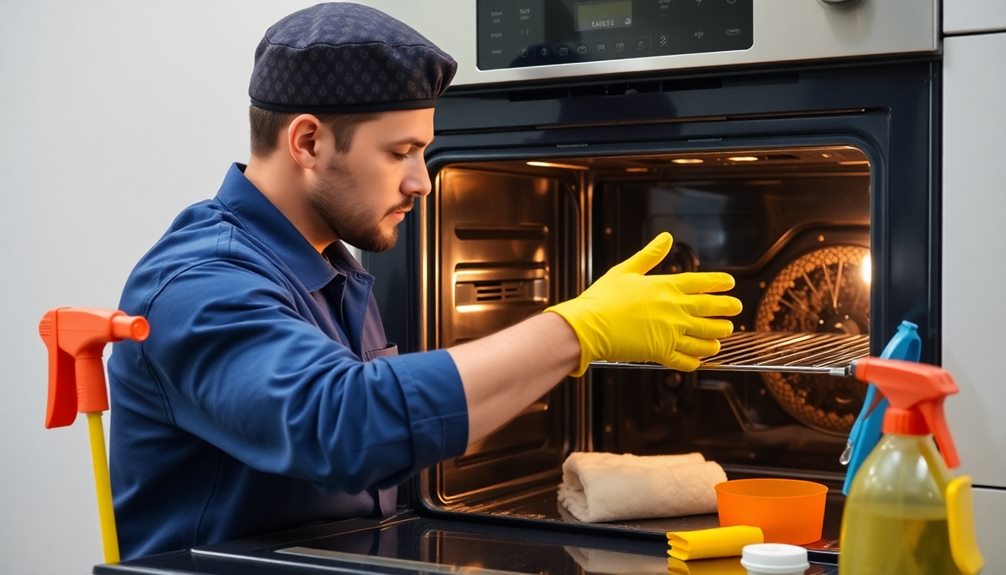
When it comes to ensuring a clean and safe oven, professional cleaning services offer an effective alternative to self-cleaning cycles. Instead of relying on self-cleaning ovens that utilize high temperatures, which can release dangerous fumes, you can opt for a thorough cleaning by specialists.
For instance, Ovenclean provides a fume-free deep cleaning service for all types of ovens, ensuring both safety and effectiveness without harsh chemicals.
By choosing professional cleaning services, you save time and greatly reduce the risks associated with self-cleaning modes. Ovenclean's exclusive cleaning system allows you to use your oven immediately after the process, making it a convenient option.
Additionally, regular oven cleaning from professionals can help extend the lifespan of your appliance by preventing the wear and tear caused by those extreme self-cleaning methods.
If you're unsure about the costs involved, you can request a free quote for professional cleaning services. This way, you can assess your options without any pressure.
With these services, you can enjoy a clean oven while ensuring your safety and the longevity of your appliance.
Frequently Asked Questions
Is It Safe to Be in House When the Oven Is Self-Cleaning?
It's not safe to stay in the house while the oven's self-cleaning. Harmful fumes can irritate your lungs and eyes, especially if you have respiratory issues. Better to step outside during the cycle.
Can Self-Cleaning Oven Fumes Hurt You?
Yes, self-cleaning oven fumes can hurt you. They may irritate your eyes, nose, and throat, and prolonged exposure can lead to more serious health issues. Guarantee proper ventilation when using the self-cleaning feature for safety.
Why Shouldn't You Use the Self-Cleaning Oven?
You shouldn't use the self-cleaning oven because the extreme heat can damage internal parts, release harmful fumes, and pose health risks. It requires effort to remove racks, and ventilation might not eliminate lingering toxins.
What Happens if You Leave Oven Racks in During Self-Cleaning?
If you leave oven racks in during self-cleaning, they can discolor and deteriorate. The extreme heat might damage their finish, and you'll likely face more ash residue to clean afterward. It's best to remove them first.
Conclusion
As you think about your next cleaning cycle, remember the hidden dangers lurking inside your self-cleaning oven. Coincidentally, it might be the very appliance intended to make your life easier that poses risks to your health and the environment. Consider the alternatives and prioritize safety over convenience. By opting for regular maintenance or professional cleanings, you're not just protecting your home—you're ensuring peace of mind for you and your loved ones with every meal you prepare.
